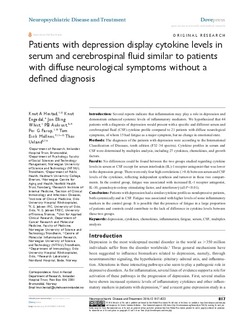Patients with depression display cytokine levels in serum and cerebrospinal fluid similar to patients with diffuse neurological symptoms without a defined diagnosis
Hestad, Knut; Engedal, Knut; Aukrust, Pål; Farup, Per Grønaas; Mollnes, Tom Eirik; Ueland, Thor; Whist, Jon Elling
Abstract
Introduction: Several reports indicate that inflammation may play a role in depression and demonstrate enhanced systemic levels of inflammatory mediators. We hypothesized that 44 patients with a diagnosis of depression would present with a specific and different serum and cerebrospinal fluid (CSF) cytokine profile compared to 21 patients with diffuse neurological symptoms, of whom 15 had fatigue as a major symptom, but no change in emotional state.
Methods: The diagnoses of the patients with depression were according to the International Classification of Diseases, tenth edition (F32–34 spectra). Cytokine profiles in serum and CSF were determined by multiplex analysis, including 27 cytokines, chemokines, and growth factors.
Results: No differences could be found between the two groups studied regarding cytokine levels in serum or CSF except for serum interleukin (IL)-1 receptor antagonist that was lower in the depression group. There were only four high correlations (>0.4) between serum and CSF levels of the cytokines, reflecting independent synthesis and turnover in these two compartments. In the control group, fatigue was associated with increased IL-1 receptor antagonist, IL-10, granulocyte-colony stimulating factor, and interferon-γ (all P<0.01).
Conclusion: Patients with depression had a similar cytokine profile as nondepressive patients, both systemically and in CSF. Fatigue was associated with higher levels of some inflammatory markers in the control group. It is possible that the presence of fatigue in a large proportion of patients and controls could contribute to the lack of difference in cytokine levels between these two groups.

